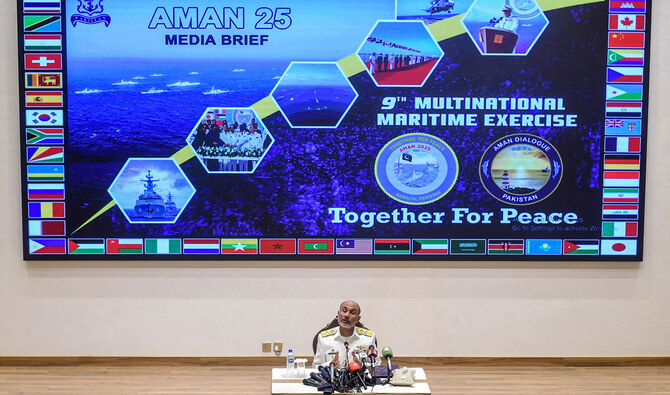ISLAMABAD: The price of solar panels has plummeted by over sixty percent in Pakistan in recent weeks due to bulk imports from China because of lower rates, importers said this week, with more consumers switching to the renewable source of power to reduce electricity bills.
The cost of producing solar panels in China, which accounts for about 80 percent of global consumption, plummeted by 42 percent in the last year, giving manufacturers there an enormous advantage over rivals in places like the United States and Europe. Multiple European solar manufacturers have announced plans to close factories in recent months, under price pressure from Chinese imports. China accounts for 80 percent of solar module production capacity after years of subsidies.
Pakistan has ideal climatic conditions for solar power generation, with over nine hours of sunlight in most parts of the country. Utilizing just 0.071 percent of the country’s area for solar photovoltaic (solar PV) power generation would meet Pakistan’s electricity demand, according to the World Bank.
But currently, only 5.4 percent of Pakistan’s installed power generation capacity of 39,772 megawatts comes from renewables like wind, solar and biomass, while fossil fuels still make up 63 percent of the fuel mix, followed by hydropower at 25 percent, according to the National Electric Power Regulatory Authority (NEPRA).
But this may change with an acute drop in the price of panels, importers said.
“A solar plate of 580 watts that I bought [last year] for 75,000 rupees [$270] has dropped to 25,000 rupees [$90] now,” Muhammad Yahya, a solar importer in Islamabad, told Arab News on Thursday. “That means it’s one-third of [earlier price].”
“The rates of the inverters are the same and keep fluctuating, but the main thing is solar panels and the rates of the solar panels are now 33 percent lower.”
Prices of solar panels dropped in China following import curtailment from major buyers including India, US and Europe while the Pakistani government had abolished a 17 percent sales tax to encourage solar imports, Yahya said, explaining the reduction in panel prices:
“People who would import through illegal channels, they [the government] blocked them, this helped stop the illegal import, and led to a bulk import, and secondly the rates [of solar panels] have dropped in China.”
Another solar panel importer in Islamabad, Abdul Moiz, agreed that the rate drop in China and curtailment of imports to India and other major buyers had led to bulk imports to Pakistan.
“America and India have stopped their imports [from China], that’s why the majority of the imports are now directed toward Pakistan,” Moiz told Arab News.
“CLIMATE CHANGE”
Despite the benefits, including to the environment of zero carbon emissions from solar panels, Pakistan is far behind in meeting its goal of shifting to 60 percent renewable energy by 2030 with 50 percent reduction in projected emissions.
Experts say procedural and bureaucratic delays in construction approvals and unattractive tariffs for selling power to the national grid coupled with a lack of political will and little government investment had blocked the progress of the solar industry in the past. For households, a big impediment, before the Chinese rate cuts, was the steep initial investment.
But that has changed, with electricity consumers describing the drop in solar panel prices as a ‘big relief’ in reducing their electricity bills.
“After its [solar panel] installation, our [electricity] cost has reduced to thirty percent,” Imran Ali Gul, a manager at a local hotel who has installed a 16kw system, told Arab News. “That’s why we preferred to get the solar system installed.”
Aamir Hussain, chairman Pakistan Alternative Energy Association, told Arab News Pakistanis purchased and installed solar panels of around 1800 megawatts last year, which was expected to jump to 3,000 megawatts this year due to the lower prices of the panels and increased customer demand.
“Pakistan will be spending over $3.5 billion [this year] on solar panels imports only as this doesn’t include import of batteries, inverters and other auxiliary items,” Hussain said. “Pakistan needs to follow consistent policies regarding renewable energy to meet its national and international obligations for the greenhouse gas emissions.”
Experts also said Pakistan, one of the most vulnerable nations to climate change impacts, needed to swiftly move to end its reliance on fossil fuels.
“There is no denying of the fact that climate change has wreaked havoc globally, so the studies suggest that in order to meet the global targets of reducing our temperature etc, in addition to transition of existing fossil fuel power plants, we should cap these fossils as well,” Manzoor Ahmed, a researcher at the Policy Research Institute for Equitable Development in Islamabad, told Arab News.
“So, given this roadmap, given our commitments in terms of net zero emissions or COP conferences where we agreed to meet global targets, we have no choice but to shift to renewables and we must do it.”
Demand for solar power rises in Pakistan as import glut crashes panel prices
https://arab.news/cnvnc
Demand for solar power rises in Pakistan as import glut crashes panel prices

- Businessmen say solar panel prices have dropped by over sixty percent due to bulk import, rate cuts by China
- Islamabad currently only generates around five percent of its energy from renewable solutions like solar power



















